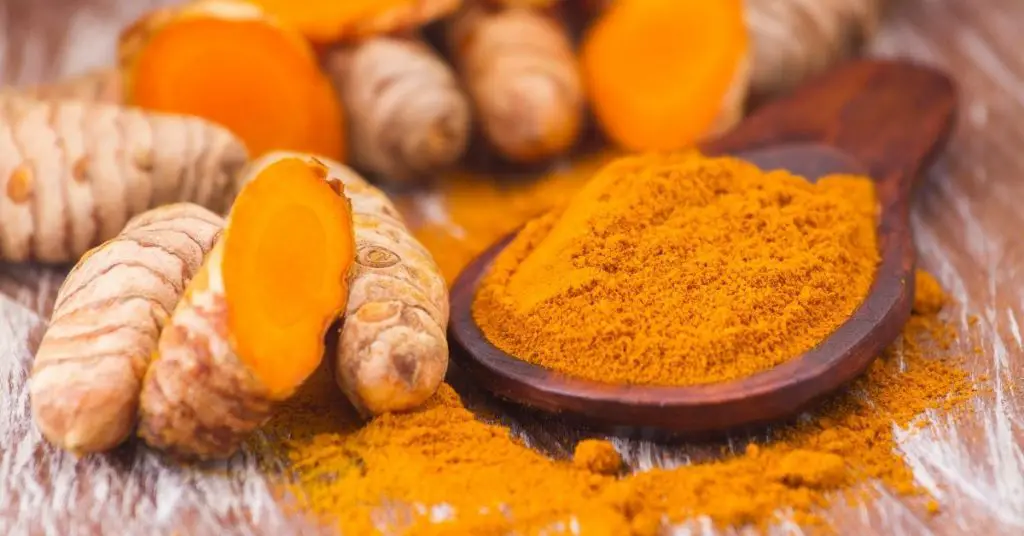The golden spice of India is much more than a key ingredient of some of our favorite dishes. Turmeric has been used medicinally for thousands of years, as well as a dye for clothing and cosmetics. The health benefits of turmeric are extensive and widely accepted, but what precisely does it help? Let’s break it down.
What Is Turmeric
Turmeric, the main spice in curry, comes from the turmeric plant and is used in many Asian cuisines. The root of the plant, which contains a yellow-colored chemical called curcumin, is also used to make medicine and color food and cosmetics.
While further research is needed, existing studies show turmeric to be beneficial for many health issues. Turmeric’s health benefits mainly come from the active ingredient curcumin, which is a powerful antioxidant and anti-inflammatory compound.
Side note: Health experts recommend taking turmeric with black pepper since curcumin doesn’t digest easily, and black pepper helps the body process it better.
Health Benefits Of Turmeric
Alleviates Depression

A recent study has shown that, in individuals taking antidepressants, the ones taking curcumin simultaneously reported lower depression levels and reduced depression symptoms. This can be attributed to turmeric’s high levels of antioxidants, which can help suppress depressive symptoms.
Improves Liver Function

Thanks to its powerful antioxidant effects, turmeric can also prevent your liver from being damaged by toxins. Those taking potent drugs for diabetes or other medical conditions that often hurt the liver could benefit immensely from the prolonged use of turmeric.
Decreases Pain & Inflammation

Turmeric’s anti-inflammatory properties help with pain and inflammation. One study noted that people with arthritis in their knees said taking turmeric worked as well for them as ibuprofen. Those who participated in the study took 800mg of turmeric (in capsule form) daily.
Helps With Psoriasis & Itching

Research shows that turmeric helps alleviate hay fever symptoms, such as itching, sneezing, and congestion. In one study, those with long-term kidney disease taking turmeric orally for two months (three times daily) reported less itching, a common symptom of kidney disease. Another study showed that turmeric tonic could improve symptoms of psoriasis.
Boosts Digestion

Turmeric’s antioxidants and anti-inflammatory properties aid in healthy digestion. For centuries, Ayurvedic medicine used turmeric as a digestive healing agent. And even today, it is used as a common home remedy. Currently, turmeric is undergoing studies to be used as an official treatment for irritable bowel syndrome.
Relieves Arthritis Symptoms

Curcumin is known to relieve some rheumatoid arthritis symptoms such as morning stiffness, pain, and swollen joints. One study showed that turmeric reduced rheumatoid arthritis symptoms better than regular ibuprofen. The Arthritis Foundation suggests taking 400-600mg capsules up to three times per day to relieve inflammation.
Reduces Menopausal Hot Flushes

Early research shows that curcumin can reduce hot flushes in some women. There hasn’t been much evidence of it affecting other menopausal symptoms, but for those who experience regular hot flushes, turmeric may be the solution!
Common Questions
How Much Turmeric Per Day
The typical dosage is between 500mg – 2,000mg per day for at least two weeks to actually feel the benefits. Taking over 3,500mg for an extended period is not recommended.
The best course of action would be to start with 500-700mg and increase as you see fit.
Conclusion
There’s a long list of health benefits of turmeric; we’ve only just scratched the surface. From aiding in healthy digestion to promoting liver function to reducing depression, turmeric does more than spice up your dinner.
As with all dietary supplements, it’s possible turmeric can react unexpectedly to your body or any medications, so it’s important to talk to your doctor before making any long-term changes to your diet.
If you’re looking for another natural powerhouse of benefits, check out the benefits of ginger, which is turmeric’s “big brother.”
